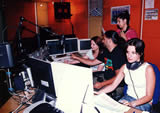
| Lingua Franca |
 |
followthemedia.com - a knowledge base for media professionals |
|
|
AGENDA
|
||
The Fun of Being an International Radio Station in AthensOlympic Games host cities always hope the huge investment will have lasting benefits. The 2004 Athens Olympic Games spawned a radio investment that continues to pay off.
|
| ftm background |
|
Radio Set for Olympic Challenge BBC Returns to Arabic TV, Vacates Eastern Europe Rough Start for Paris Radio in English DAB Catching On With Commercial Broadcasters See also... |
Athens International Radio’s launch was modest: rebroadcasting the BBC World Service four hours a day from March 2004. By May the station was producing its’ own local news. Now the 24 hour, 7 day a week programming includes daily broadcasts and news bulletins in English, French, German, Greek, Italian, Spanish, Arabic, Albanian and Russian. Weekly programs are offered in Bulgarian, Polish and Tagalog. Soon the station will offer an Urdu program.
Athens International Radio 104.4 FM (AIR) is licensed to the municipality of Athens, which also operates the Greek-language municipal station Athena 98.4. The two stations share facilities and studios. Both are public service stations but not associated with Greek state broadcaster ERT (Hellenic Broadcasting Corporation). Athena 98.4 was launched 18 years ago as the first non-state broadcaster. ERT offers a multi-cultural, multi-lingual channel for foreigners called Filia, operating on MW and FM. Sky 100.3, a privately owned station, broadcasts news bulletins from the BBC Greek Service and the Voice of America.
AIR takes advertising but it does not generate sufficient revenue to sustain the station. “Even given the synergies (with various broadcast partners),” says Polyzodis, “I don’t think it would be commercially viable.” The station promotes itself through ad barters with local foreign language newspapers and participation in local events as a media partner.
The station’s ambitious cultural reach, broadcasting in 12 languages, is made possible with partnerships with international broadcasters – BBC World Service, Deutsche Welle and Radio France International – and International Media Network, a publisher of weekly newspapers in several languages. The majority of the stations’ 65 employees work in news and program production that includes English daily music and talk shows in the morning (Good morning Athens, Athens Live and Talk of the Town), midday (Good Afternoon Athens and DE-ES-IT) and evening (Good Evening Athens, Spin and Midnight Flight). Deutsche Welle and Radio France International provide daily programs, one hour in German six days a week and two hours in French five days a week, respectively. Daily five-minute segments offer Greek language tips for English, Albanian and Russian speakers.
“Athens has changed dramatically over the last ten years,” says Polyzoidis, who manages the station with co-managing editor Ersie Vabou. “Now there are hundreds of thousands of foreign nationals living here.”

“It’s great fun to work with such a diverse group of people,” he remarked. “And they all bring a different point of view. We have an English guy on staff, who has lived here for many years and just loves rugby. Well, we were the only station in Greece to broadcast the Greek-Bulgarian Rugby Union match.”
And he added, “I think the people working for our sister station wish they could have as much fun.”
AIR offers considerable information for tourists but it has developed well beyond giving tips on sightseeing and restaurants. Athens Mayor Dora Bakoyannis, reviewing in January the successful 2004 Games, called the station one of the many bright points in the city.
Polyzoidis describes the station’s target audience as two “distinct categories. One is West European, North American, Australian and very affluent.” The other audience is immigrants who, he says, “obviously have a different outlook.”
Simply put, he says, “It’s the British ambassador and the African immigrant.”
Athens, as any visitor would notice, has changed considerably in the last decade. Gone are the hundreds of illegal pirate stations that dotted, or blotted, the radio landscape, now only a few. But the pirate problem continues and the mountainous terrain in and around Athens poses an on-going problem for AIR and all other Athens broadcasters, some also using illegal repeaters. Polyzoidis added that the new licensing round, due by the end of 2005, is designed to improve signal distribution for all stations. Fifty stations operate legally in the Athens area, down from more than 80 just four years ago. Mount Pamitha has been suggested for a new antenna farm that all stations might use.
Polyzoidis’ sees the signal problem as a significant “impediment to listenership.” And a solution is his top priority, along with developing an on-line presence and “maybe we could produce more talk programs.”
But, overall, he is pleased with the sound of the station. “I think the mix is quite OK.”
Previously published in Radio World International, October 2005, in a slightly different form
| copyright ©2004-2007 ftm partners, unless otherwise noted | Contact Us • Sponsor ftm |